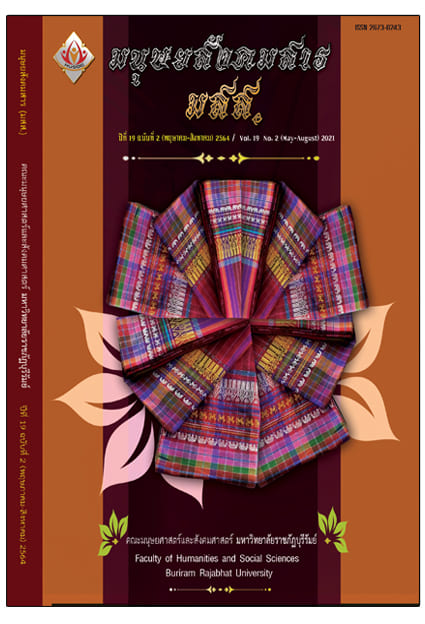ผลการใช้แบบฝึกทักษะและกระบวนการจัดการเรียนรู้รูปแบบซิปปา เพื่อพัฒนาผลสัมฤทธิ์ทางการเรียนด้านการอ่านและเขียน สะกดคำของนักเรียนชั้นประถมศึกษาปีที่ 1
Main Article Content
บทคัดย่อ
การวิจัยครั้งนี้มีวัตถุประสงค์เพื่อ 1) พัฒนาแบบฝึกทักษะการอ่านและเขียนสะกดคำระดับชั้นประถมศึกษาปีที่ 1ให้มีประสิทธิภาพ ตามเกณฑ์ 80/80 2) ศึกษาดัชนีประสิทธิผลของ การเรียนด้วยแบบฝึกทักษะการอ่านและเขียนสะกดคำ และกระบวนการจัดการเรียนรู้รูปแบบซิปปา ของนักเรียนชั้นประถมศึกษาปีที่ 1 3) เปรียบเทียบผลสัมฤทธิ์ทางการเรียนด้านการอ่านและเขียนสะกดคำของนักเรียนชั้นประถมศึกษาปีที่ 1 ก่อนและหลังการจัดการเรียนรู้โดยใช้แบบฝึกทักษะและการจัดการเรียนรู้รูปแบบซิปปา และ 4) ศึกษาความคงทนทางการเรียนด้านการอ่านและเขียนสะกดคำของนักเรียนชั้นประถมศึกษาปีที่ 1 ที่ใช้แบบฝึกทักษะและการจัดการเรียนรู้รูปแบบซิปปา กลุ่มตัวอย่าง เป็นนักเรียนชั้นประถมศึกษาปีที่ 1 โรงเรียนเขว้าศึกษา สำนักงานเขตพื้นที่การศึกษาประถมศึกษาบุรีรัมย์ เขต 2 จำนวน 1 ห้องเรียน รวม 17 คน ได้มาโดยวิธีการสุ่มแบบกลุ่ม เครื่องมือที่ใช้ในการวิจัยได้แก่ แบบฝึกทักษะ แผนการจัดการเรียนรู้รูปแบบซิปปา และแบบทดสอบวัดผลสัมฤทธิ์ สถิติที่ใช้ได้แก่ ค่าเฉลี่ย () ร้อยละ (%) ส่วนเบี่ยงเบนมาตรฐาน (S.D.) และ t-test dependent ผลการวิจัยพบว่า แบบฝึกทักษะมีประสิทธิภาพเท่ากับ 87.91/84.12 ค่าดัชนีประสิทธิผลของการเรียนด้วยแบบฝึกทักษะการอ่านและเขียนสะกดคำ และกระบวนการจัดการเรียนรู้รูปแบบซิปปา ของนักเรียนชั้นประถมศึกษาปีที่ 1 เท่ากับ 0.7112 แสดงว่านักเรียนมีความรู้เพิ่มขึ้นเท่ากับ 0.7112 หรือคิดเป็นร้อยละ 71.12 ผลสัมฤทธิ์ทางการเรียนหลังเรียนสูงกว่าก่อนเรียนอย่างมีนัยสำคัญที่ระดับ .05 ผลสัมฤทธิ์ทางการเรียนหลังเรียนแล้ว 2 สัปดาห์ ไม่แตกต่างกับผลสัมฤทธิ์ทางการเรียนหลังเรียน แสดงว่านักเรียนที่ใช้แบบฝึกทักษะ และกระบวนการจัดการเรียนรู้รูปแบบซิปปา มีความคงทนทางการเรียนรู้
Article Details

อนุญาตภายใต้เงื่อนไข Creative Commons Attribution-NonCommercial 4.0 International License.
เนื้อหาและข้อมูลในบทความที่ลงตีพิมพ์ในวารสารทดสอบระบบ ThaiJo2 ถือเป็นข้อคิดเห็นและความรับผิดชอบของผู้เขียนบทความโดยตรงซึ่งกองบรรณาธิการวารสาร ไม่จำเป็นต้องเห็นด้วย หรือร่วมรับผิดชอบใดๆ
บทความ ข้อมูล เนื้อหา รูปภาพ ฯลฯ ที่ได้รับการตีพิมพ์ในวารสารทดสอบระบบ ThaiJo2 ถือเป็นลิขสิทธิ์ของวารสารทดสอบระบบ ThaiJo2 หากบุคคลหรือหน่วยงานใดต้องการนำทั้งหมดหรือส่วนหนึ่งส่วนใดไปเผยแพร่ต่อหรือเพื่อกระทำการใดๆ จะต้องได้รับอนุญาตเป็นลายลักอักษรจากวารสารทดสอบระบบ ThaiJo2 ก่อนเท่านั้น
เอกสารอ้างอิง
Amnongpo, W. (2014). The development of spelling form exercises by using Mind Mapping for grade 1 students. Master of Education Thesis (Curriculum and Supervising). Nakhon Pathom: Graduate School of Sillapakorn University. [in Thai]
Choenjai, T. (2018). Effects of skill exercises and Brain Based Learning (BBL) teaching method for developing writing skill of grade 1 students studying in Rangseewitthaya School, Fang district, Chiang Mai province. Master of Education Thesis (Thai Language Teaching) Chiang Rai: Graduate School of Chiang Rai Rajabhat University. [in Thai]
Khammanee, T. (2010). Pedagogy: Knowledge for organizing effective learning process (13th ed.). Bangkok: Publisher of Chulalongkorn University. [in Thai]
Kunpipak, T. (2018). Development of reading and spelling exercises by employing a Collaborative Learning and Mind Mapping technique affecting reading and writing skills, satisfaction, and learning achievement of grade 2 students. Master of Education Thesis (Research and Education Development). Sakon Nakhon: Graduate School of Sakon Nakhon Rajabhat University. [in Thai]
Ministry of Education. (2017). Education development plan of the Ministry of Education No. 12 (2017-2021). Bangkok: Office of Policy and Strategy. Office of the Permanent Secretary for Education Ministry of Education.
[in Thai]
Moondee, P. (2003). Developing learning plans and spelling exercises that the spelling is irregular, Thai language course of grade 2 students. Master of Education Thesis (Curriculum and Teaching). Mahasarakham: Graduate School of Mahasarakham University. [in Thai]
Moonkam, S. & Moonkam, O. (2003). 21 Methods of organizing learning to develop thinking process. Bangkok: Parbpim.[in Thai]
Namtong, P. (2018). Development of reading and spelling ability by brain-based learning activities and skill exercises of grade 1 students. Master of Education Thesis (Curriculum and Teaching). Mahasarakham: Graduate School of Mahasarakham University. [in Thai]
Office of the Basic Education Commission, Ministry of Education. (2019). Report of results of grade 1 students’ literacy assessment (Reading Test: RT) in , academic year 2018. Retrieved on October28, 2019 from
URL(File:///C:/Users/MZ_SstepUp3g/Downloads/RT01_P11031260194.pdf)[in Thai]
Office of the Education Council Secretariat. (2017). National education plan 2017-2036. Bangkok: Prik Wan Graphic Co., Ltd. [in Thai]
Pakiraka, P. (2015). Effects of using reading and spelling exercises with multi intelligence learning model for grade 1 students. Master of Education Thesis (Curriculum and Learning Management). Buriram: Graduate School of Buriram Rajabhat University. [in Thai]
Porata, S. (2015). Developing the ability to write for telling stories of grade 2 students studying at Prince Royal’s College by CIPPA Model. Master of Education (Thai Language Teaching). Chiang Mai: Graduate School of Chiang Mai University. [in Thai]
Seehawong, W. (2017). The development of irregular spelling by employing a skill training exercises and CIPPA teaching method for grade 2 students. Master of Education Thesis (Curriculum and Instruction). Chiang Rai: Graduate School of Chiang Rai Rajabhat University. [in Thai]
Siripayak, N. (2016 ). Effects of regular spelling exercises through STAD Learning Method for grade 1 students. Master of Education Thesis (Curriculum and Learning Management). Buriram: Graduate School of Buriram Rajabhat University. [in Thai]


